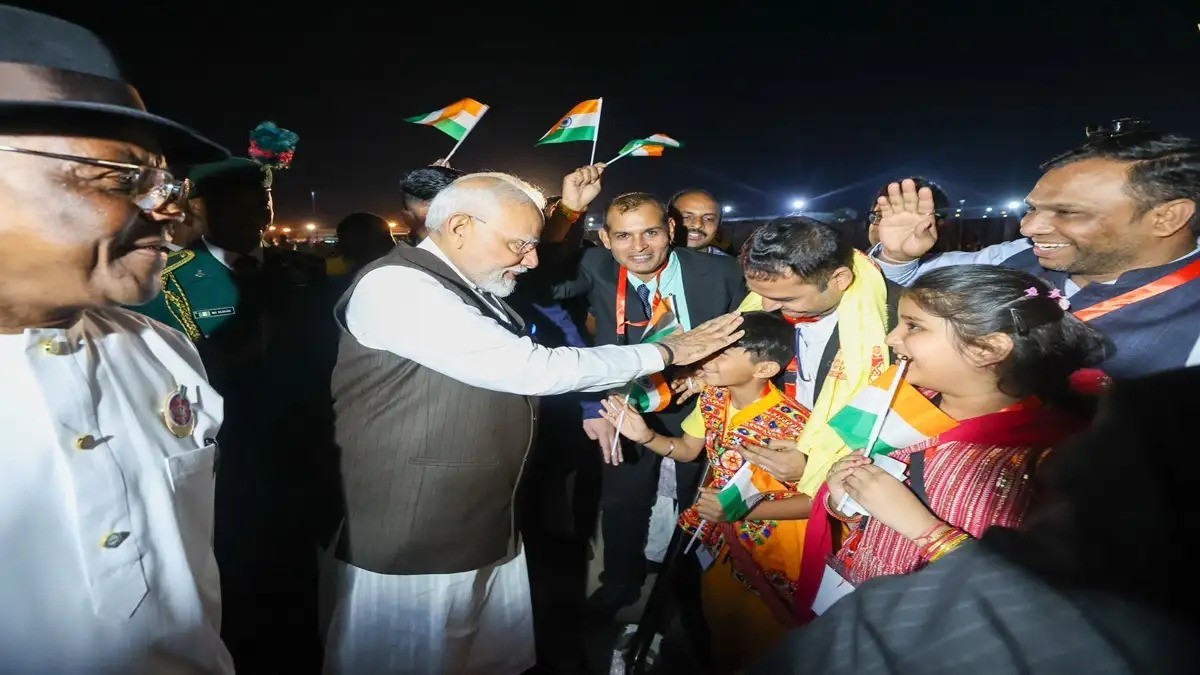
Prime Minister Narendra Modi’s latest visits to Nigeria and Guyana exemplify a critical juncture in India’s diplomatic outreach to Africa and the Caribbean, highlighting the significance of the visit for India’s foreign policy. The relationships between the countries are built upon shared histories, common developmental goals, and aspirations, and at the same time mutual strategic interests. With Nigeria and Guyana emerging as key players in global energy markets in their respective locations, these visits are poised to elevate bilateral ties, enhance India’s foreign policy objectives, and contribute to a more multipolar world order.
India and Nigeria share a historical bond rooted in anti-colonial struggles, post-independence solidarity, and participation in the Non-Aligned Movement (NAM). On the other hand, the roots of India-Guyana relations lie in the shared history of enslaved labourers during British colonial rule. After India’s independence, New Delhi officially established diplomatic relationships with Nigeria and Guyana in the years of 1962 and 1966, respectively.
PM Modi’s tour involves significant geopolitics, which begins with Nigeria, Africa’s most populous country and a major player in the region, before moving to Guyana, which holds strategic importance in the Caribbean. Both countries share historical connections with India, underscored by a long-standing Indian diaspora that strengthens cultural and economic ties. India is one of Nigeria’s biggest trading partners, with a stronghold of two-way trade that hit about $15 billion in the 2021-2022 financial year, even with the COVID-19 pandemic’s effects.
The major exports from India include medicines, machines, and fabrics, while Nigerian crude oil is also brought in. This cooperation shows how much these two countries have come to rely on each other over time. Not only is the relationship limited to trade or economics, but the two nations also equip and help Nigeria to enhance its defence capabilities.
At the same time, Guyana has become a key player in the world’s oil market after finding huge oil deposits offshore. India is a major importer of oil; for instance, in the financial year of 2023-2024, India imported around 232.5 million metric tonnes (MMT) of crude oil.
With the same intensity, India has long supported Guyana through various ways, such as opportunities with scholarships, training programs, and capacity-building initiatives under the ITEC (Indian Technical and Economic Cooperation) program. This educational cooperation is critical for empowering the next generation of leaders in Guyana and fostering long-term ties between the peoples of both nations. International relations come with theories that explain state behaviours and guide why states go for certain foreign policies while cooperating with countries and major players in the international system.
Similarly, PM Narendra Modi’s visit to Nigeria, followed by Guyana, can be analysed from the lens of international relations theories. From a realist school perspective, PM Modi’s engagement can be explained as a strategic maneuver to improve India’s power and security. In this context, strengthening ties with Nigeria and Guyana fosters a purposeful cooperation of supplies and capabilities to advance India’s standing in global politics.
As realism often takes the notion of ‘power’ seriously, like that of ‘security’, so this visit for the realist can be seen as a means of establishing power in various countries across different parts of the world, making a presence of itself, so that options remain open for future opportunities in the anarchic world order, when India’s competitors, especially China, are constantly establishing their prominence in countries through different outreach. The liberal school that stressed ‘economic interdependence’ will see this trip as an extension of ‘Mutual Economic Cooperation’, which would ensure peace and stability within a globalised economy. Constructivism, on the other hand, focuses on the role of identity and ethos in international relations.
The historical bonds constructed through shared anti-colonial descriptions shape the contemporary identities of both nations, fostering collaborative engagements. This emphasis on shared identity enables New Delhi to build diplomatic frameworks that transcend mere transactional relations, promoting a long-term vision rooted in mutual respect and historical connections not just limited to governments but also the general people. Despite the numerous positives, there also exist challenges when it comes to cooperation, which can complicate situations, for instance, the amount of corruption and economic crisis in Nigeria, which can give rise to terror activities and become threats to foreign investments.
New Delhi needs to ensure that businesses are not impeded by internal challenges. Prime Minister Narendra Modi’s visits to Nigeria and Guyana have a profound implication for India’s foreign policy. This engagement signifies not only a historical acknowledgment of shared narratives but also a strategic alignment toward achieving mutual goals in security, economic growth, and cultural diplomacy.
As India asserts itself on the world stage as an ‘emerging great power’, the same was reflected by John Mearsheimer, one of the major international relations theorists. In the end, PM Modi’s outreach to Nigeria and Guyana reflects an evolving narrative in international relations affirming that India’s future is intertwined with that of the world, where collaboration, understanding, and mutual growth are predominant. Pritam Sarbabidya is pursuing a Master of Arts in Politics and International Relations at the Department of Politics and International Studies, Pondicherry University.
The views expressed in the above piece are personal and solely those of the author. They do not necessarily reflect Firstpost’s views..














